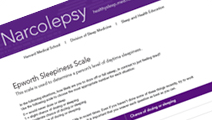The Takeaway
- The Epworth Sleepiness Scale can be used to assess daytime sleepiness. For other ways to identify problematic sleepiness, see Self-Evaluation.
- Daytime sleepiness can have many causes, including narcolepsy, which affects up to 1 in 2,000 people.
Dr. Scammell explains the Epworth Sleepiness Scale.
In the following situations, how likely are you to doze off or fall asleep, in contrast to just feeling tired? Use the following scale to choose the most appropriate number for each situation:
| 0 | would never doze or sleep |
| 1 | slight chance of dozing or sleeping |
| 2 | moderate chance of dozing or sleeping |
| 3 | high chance of dozing or sleeping |
This refers to your usual way of life in recent times. Even if you haven't done some of these things recently, try to work out how they would have affected you. It is important that you answer each question as best as you can.
| Situation | Chance of dozing or sleeping | |||
|---|---|---|---|---|
| 0 | 1 | 2 | 3 | |
| Sitting and reading | ||||
| Watching TV | ||||
| Sitting inactive in a public place | ||||
| Being a passenger in a car for an hour | ||||
| Lying down in the afternoon | ||||
| Sitting and talking to someone | ||||
| Sitting quietly after lunch (no alcohol) | ||||
| Stopping for a few minutes in traffic while driving | ||||
| Total Epworth Score | ||||
UNDERSTANDING YOUR SCORE
| 0–10 | Normal range in healthy adults |
| 11–14 | Mild sleepiness |
| 15–17 | Moderate sleepiness |
| 18 or higher | Severe sleepiness |

Epworth Sleepiness Scale
If you scored 11 or higher, consider seeing a sleep medicine specialist to diagnose and treat the cause of your sleepiness.
Epworth Sleepiness Scale © Copyright M.W. Johns 1990–97